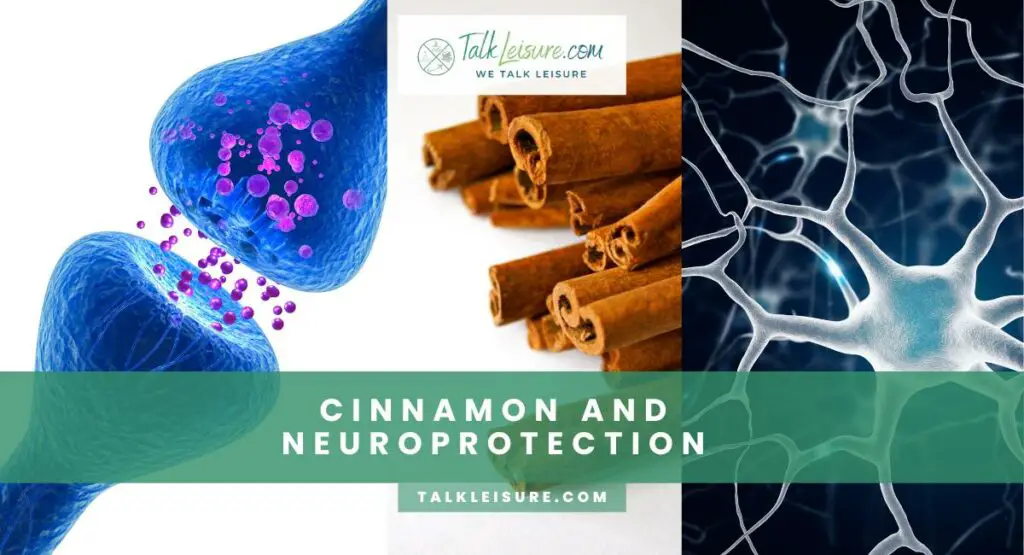In the delightful world of spices, cinnamon not only adds a warm and comforting flavor to our favorite treats but also brings a surprising potential for supporting brain health.
Imagine a spice that enhances the taste of your morning oatmeal and may also contribute to protecting your brain.
According to many researchers, there are several components in cinnamon, like cinnamaldehyde, that have an affective potential on diseases like Parkinson’s, Alzheimer’s, and many brain function-related conditions.
This article explores the fascinating connection between cinnamon and neuroprotection, unraveling the simple yet powerful ways this common kitchen spice may benefit our cognitive well-being.
So, let’s dive into the aromatic world of cinnamon and discover how it might be doing more than just spicing up our recipes.
What Is Cinnamon?

Cinnamon is a popular spice derived from the bark of trees in the Cinnamomum family.
It is commonly used in sweet and savory dishes beverages, and even as a seasoning in some cuisines.
Cinnamon is also highly valued for its potential health benefits, particularly neuroprotection and anti-inflammatory qualities.
Cinnamon contains several components that contribute to its potential neuroprotective effects.
The primary active compound is cinnamaldehyde, which has been shown to activate neuroprotective enzymes and reduce inflammation in the brain.
Additionally, cinnamon contains antioxidants, which may help to protect cells from oxidative stress and damage.
Cinnamon is a delicious and versatile spice that offers potential health benefits.
Incorporating cinnamon into your daily diet can be a simple and enjoyable way to promote neurological and overall health.
Does Cinnamon Help The Nervous System?

Cinnamon has been shown to have potential neuroprotective effects, making it a potential holistic approach to managing neurological conditions.
Cinnamaldehyde, the primary active component in cinnamon, has been found to activate neuroprotective enzymes and reduce inflammation in the brain, benefiting the nervous system’s overall health.
Scientific Research Approach To Cinnamon And Brain Health
Studies have suggested that cinnamon may also positively affect cognition, with one study finding that it improved learning ability and memory in mice.
Furthermore, it has been found to upregulate neuroprotective proteins, Parkin and DJ-1, significantly protecting the brain’s neurons from oxidative stress and damage.
Also, some researchers wanted to see if cinnamon, which comes from the bark of Cinnamomum trees, impacts memory and learning. They looked at 2,605 studies and selected 40 that met their criteria. Out of these, 33 were studies on animals, five were done in labs, and 2 were clinical studies involving people.
Their cognitive function improved when animals were given cinnamon or its components like eugenol, cinnamaldehyde, and cinnamic acid.
Lab studies also showed that adding cinnamon or cinnamaldehyde to cells reduced the formation of harmful substances (tau aggregation, Amyloid β) and increased cell health.
In clinical studies with people, one showed positive effects on cognitive function, while another didn’t show any changes.
Overall, the research suggests that cinnamon might help prevent and reduce problems with memory and learning. It could be used alongside other treatments for related diseases. However, more studies are needed to understand the effectiveness of cinnamon.
While cinnamon alone may not cure neurological conditions, incorporating it into your daily diet can be a simple and enjoyable way to promote neurological health and overall well-being.
Consider incorporating cinnamon into your meals or enjoy it as a warm spice tea for a natural boost in promoting positive neurological effects.
What Is Neuroprotection Effect?
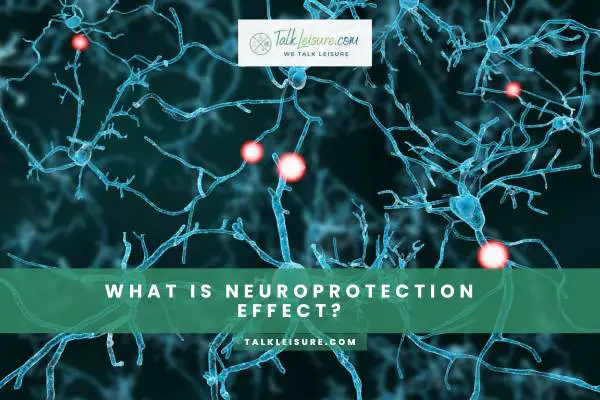
Neuroprotection refers to protecting neurons from damage and degeneration, which is crucial in maintaining the health of the nervous system.
The neuroprotection effect can be achieved through lifestyle changes, medications, and natural remedies like cinnamon.
Cinnamon has been found to activate neuroprotective enzymes and reduce inflammation in the brain, making it a potential holistic approach to managing neurological conditions. Additionally, cinnamon’s active component, cinnamaldehyde, has been found to positively affect cognition and memory function.
Studies have also shown that cinnamon can upregulate neuroprotective proteins protecting brain neurons from oxidative stress and damage.
However, while cinnamon alone may not cure neurological conditions, incorporating it into your daily diet can be a simple and enjoyable way to promote neurological health and overall well-being.
In conclusion, the neuroprotective effect is essential in maintaining the health of the nervous system, and cinnamon can play a significant role in promoting it.
Is Cinnamon Neuroprotective?
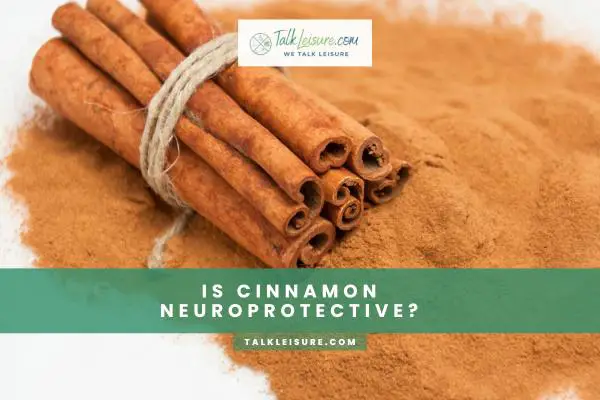
Cinnamon has been a popular spice in traditional medicine for its numerous health benefits, including potential neuroprotective effects.
While cinnamon alone may not cure neurological conditions, incorporating it into your daily diet can be an easy and enjoyable way to promote neurological health.
However, more research is needed to determine the extent of cinnamon’s neuroprotective effects and its potential for clinical use.
So, enjoy your cinnamon-spiced meals and drinks while considering its potential neuroprotective benefits.
The Application Potential of Cinnamon In Neuroprotection

The nervous system, which includes the central, peripheral, and autonomic nervous systems, can be affected by various diseases.
These diseases can cause problems with our senses, movement, awareness, and automatic body functions. This can significantly impact a person’s life.
Now, in medicine, cinnamon is believed to have some positive effects.
It’s thought to help with things like boosting energy, warming the digestive system, and improving blood circulation.
Modern research supports this by showing that cinnamon has anti-oxidant properties (good for fighting off harmful substances in the body), can reduce inflammation, and may even benefit the nervous system.
Cinnamon might have some sound effects on our nervous system, helping with diseases that affect how we think, move, and feel.
Cinnamon’s Neuroprotective Potential In Parkinson’s
Parkinson’s disease (PD) is a common disorder without a cure, but people are exploring new and affordable ways to help, like using medicinal plants.
One promising plant is cinnamon, known for its unique taste and smell. Studies suggest that cinnamon, particularly its essential oils like cinnamaldehyde, may protect the brain from damage in PD.
When given to mice with a PD-like condition, cinnamon powder and sodium benzoate (a compound in cinnamon) taken by mouth showed protective effects. These included safeguarding specific brain cells, balancing essential brain chemicals, and improving movement.
Cinnamon works by controlling cell recycling, acting as an antioxidant, boosting the production of protective proteins, and influencing specific cell pathways.
It also seems to reduce inflammation in the brain. Significantly, cinnamon may impact the clumping together of a problematic protein called α-synuclein, a key player in PD.
Despite these promising findings, more research is needed to understand how cinnamon works against PD fully. Scientists should explore additional aspects of its effects and identify any challenges or limitations.
Overall, cinnamon shows potential as a natural therapy for PD, but further studies are necessary before it can be considered a standard treatment.
Cinnamon Neuroprotective Potential In Alzheimer
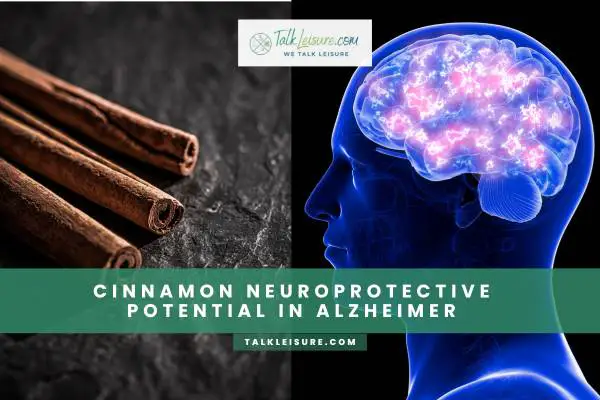
In recent years, there has been a significant increase in efforts to find treatments for Alzheimer’s disease (AD).
Scientists are exploring natural compounds, particularly those found in various types of cinnamon, as potential remedies. These compounds have a long history of use in addressing different health issues.
The focus is on combating two critical features of AD: tau protein aggregation and the build-up of amyloid-β peptides, both of which are associated with the disease.
The researchers discuss how certain polyphenols in cinnamon, known as cinnamon polyphenols (PPs), interact with oxidative stress and inflammation pathways in the brain.
It also explores the possible connection between AD and diabetes, looking at how cinnamon PPs might play a role in this relationship.
The researchers also touch on the emerging understanding of the epigenetic factors contributing to AD and how cinnamon might influence these conditions.
Cinnamon demonstrates neuroprotective effects by impacting multiple oxidative stress and inflammation pathways.
Additionally, it positively affects endothelial functions and reduces vascular cell adhesion molecules.
There’s an intriguing suggestion that cinnamon PPs may induce epigenetic modifications related to AD.
Among the compounds in cinnamon, cinnamaldehyde shows promise as an effective and safe approach for treating and preventing the onset or progression of AD.
However, it’s essential to note that while these findings are promising, more in-depth molecular research and extended clinical trials are necessary to confirm the safety and effectiveness of using different types of cinnamon for therapeutic purposes in Alzheimer’s disease.
Cinnamon In Neurodegenerative Disease
The studies emphasize the positive effects of cinnamon and its metabolite, sodium benzoate (NaB), on the brain.
They increase the levels of essential brain proteins, called neurotrophic factors, which help in the growth and survival of neurons.
These factors are crucial in conditions where neurons are lost, like neurodegenerative disorders.
Sodium benzoate, found in cinnamon, is known to induce the production of these neurotrophic factors in human brain cells.
Cinnamon is consumed orally, and it increases the level of sodium benzoate in the blood and brain, leading to an increase in neurotrophic factors in the brains of mice.
This suggests that cinnamon may positively impact the brain, potentially delaying or ameliorating neurodegenerative conditions.
The study also found that sodium benzoate activates a specific pathway in the brain involving a protein called CREB.
This activation is crucial for the production of neurotrophic factors.
This suggests that this pathway is essential for the beneficial effects of cinnamon on the brain.
In simpler terms, cinnamon and its component, sodium benzoate, might promote brain health by increasing the levels of protective proteins.
This could be beneficial in conditions where the loss of neurons is problematic, like in diseases such as Alzheimer’s or Parkinson’s.
However, more research is needed to understand and confirm these potential benefits fully.
What Are The Components In Cinnamon That Help To Neuroprotection
| Sr. No. | Constituents | Pharmacological Role |
|---|---|---|
| 1 | Cinnamic acid | Antidepressant, anti-Parkinson, antiamyloidogenic |
| 2 | Eugenol | Antiamyloidogenic, anti-Parkinson, antidepressant, antiamnesic |
| 3 | Cinnamophilin | Neuroprotection |
| 4 | Sodium benzoate | Anti-Parkinson, antiamnesic, anti-Alzheimer, antidepressant |
Cinnamon has long been recognized as a potent spice with unique health benefits.
One of its most promising applications is in neuroprotection, particularly in neurodegenerative diseases like Alzheimer’s and Parkinson’s disease.
Cinnamon contains cinnamaldehyde, a compound shown to have potent neuroprotective effects.
This substance helps to reduce inflammation and oxidative stress in the brain, which are significant contributors to neurodegeneration.
Studies have found that cinnamaldehyde can improve cognitive function and memory and protect the brain from damage caused by various toxins and stressors.
Furthermore, cinnamon also contains metabolites like sodium benzoate, which have a neuroprotective impact.
These compounds can help to prevent the death of neurons, reduce plaque formation, and boost the survival of brain cells.
Cinnamon’s unique combination of cinnamaldehyde and metabolites makes it a promising ingredient for promoting brain health and neuroprotection.
The Neuroprotective Mechanism Of Cinnamaldehyde
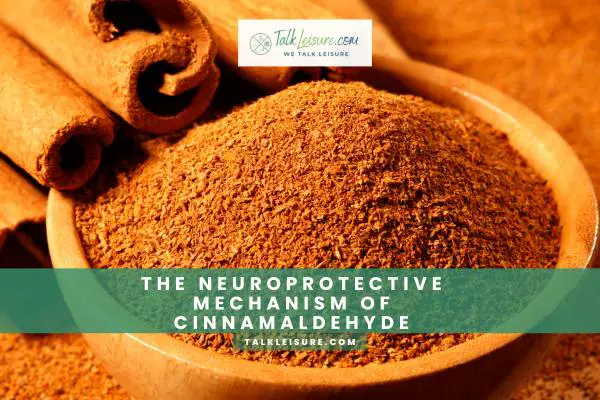
The researchers explored the effects of cinnamaldehyde, a compound found in cinnamon, on specific receptors in the brain.
The studies utilized non-selective substances that can broadly influence adenosine and ryanodine receptors, which are involved in various cellular processes.
A limitation of the study was the non-specific nature of these substances.
The researchers recommend that future studies employ more specific substances to target these receptors more precisely.
Further research is needed to comprehend the mechanisms behind cinnamaldehyde’s neuroprotective effects fully.
However, it appears that these effects may involve inhibiting adenosine and NMDA receptors coupled with stimulating ryanodine receptors. The researchers also noted that enhancing the neuroprotective effects of cinnamaldehyde could be achieved by inhibiting the GSK-3β protein.
The results suggest that cinnamaldehyde may positively impact brain cells by influencing specific receptors and proteins. The researchers emphasize the importance of future studies utilizing more targeted substances and alternative evaluation methods to better understand how cinnamaldehyde protects the brain.
Metabolite Sodium Benzoate Attenuate In Cinnamon And Brain Health
Apart from cinnamaldehyde, another metabolite found in cinnamon that has caught the attention of researchers is sodium benzoate, which is known for its antimicrobial properties. Sodium benzoate also has neuroprotective effects and is effective in the treatment of various neurodegenerative disorders.
Cinnamon and its compound sodium benzoate (NaB) may help protect memory and learning in Alzheimer’s disease (AD).
They found that NaB, derived from cinnamon, reduced oxidative stress in the brain by inhibiting the production of harmful reactive oxygen species (ROS) in mice with AD.
The study suggests that NaB affects a pathway involved in oxidative stress and reduces cholesterol levels.
Interestingly, the study found that cinnamon and NaB suppressed the activation of a protein called p21rac, associated with oxidative stress, in the brains of mice with AD.
This led to less oxidative damage, reduced inflammation, and improved memory and learning.
The researchers propose that cinnamon and NaB could be a promising and affordable natural supplements for slowing down or delaying the progression of Alzheimer’s disease.
Interestingly, sodium benzoate is also used as a food preservative, which makes it a readily available and low-cost option for neuroprotection.
Adding cinnamon to your diet could positively affect your brain health and reduce the risk of neurodegenerative diseases.
As more studies emerge on the neuroprotective properties of cinnamon, it becomes clearer that cinnamon is indeed a promising natural ingredient for promoting brain health and reducing the risk of neurodegenerative conditions.
Cinnamon Treatment Upregulates Neuroprotective Proteins Parkin and DJ-1
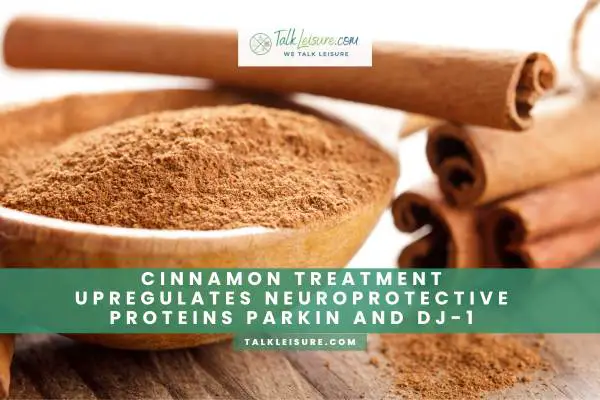
Recent research has found that cinnamon could have a positive impact on neuroprotection.
One of the mechanisms behind this lies in the upregulation of neuroprotective proteins Parkin and DJ-1.
Parkin and DJ-1 are proteins that help protect neurons and are essential for healthy brain function.
Studies have shown that cinnamon treatment can increase the levels of these proteins in the brain, thus improving the brain’s ability to fight off neurodegenerative diseases such as Alzheimer’s and Parkinson’s.
Aside from this, cinnamon also contains other compounds that can promote brain health, including cinnamaldehyde and sodium benzoate.
Its neuroprotective properties make cinnamon a promising natural ingredient for enhancing brain function and reducing the risk of neurodegenerative disorders.
Incorporating cinnamon into your diet could provide neuroprotective benefits and improve brain health.
Further research is needed to fully understand cinnamon’s impact on neuroprotection, but the initial findings are promising.
Does Cinnamon Affect Dopamine?
Cinnamon has been studied for its potential effects on dopamine, a brain chemical linked to mood and movement. Some research in humans suggests that cinnamon may increase dopamine levels.
Two studies found that using cinnamon for a few weeks was associated with higher dopamine levels in healthy people and those with type 2 diabetes.
These studies also showed improvements in blood sugar and other health markers.
Researchers are interested in how cinnamon might help with dopamine-related diseases like Parkinson’s.
Cinnamon has shown protective effects on brain cells and improved dopamine function in animals.
A study in people with Parkinson’s disease found that cinnamon extract improved motor symptoms and quality of life.
While more research is needed, these findings suggest that cinnamon could benefit dopamine-related conditions.
If you want to try cinnamon for mood or brain health, remember that it might take weeks or months of regular use to see significant results.
Also, it’s essential to maintain a healthy lifestyle with a balanced diet and exercise for the best outcomes.
Final Thoughts
In conclusion, cinnamon has shown promising results in providing neuroprotection.
With its anti-inflammatory and antioxidant properties, it has the potential to protect brain cells and slow down the progression of neurological disorders such as Parkinson’s disease and Alzheimer’s disease.
Additionally, research has revealed that cinnamon may affect dopamine levels in the brain.
As dopamine dysfunction is a key factor in several neurological disorders, this discovery opens up a new avenue for potential treatment and prevention of these conditions.
While there is still much more to uncover about the full extent of cinnamon’s neuroprotective effects, there is no doubt that it is a valuable spice to incorporate into your diet.
With its delicious flavor and numerous potential health benefits, including cinnamon in your meals is an easy and enjoyable way to boost your brain health.
FAQ
What Are The Spices Affect Neuroprotection?
Apart from cinnamon, other spices have neuroprotective effects that are worth exploring.
These spices contain antioxidants, anti-inflammatory agents, and other essential compounds that can protect and boost brain health.
For instance, turmeric is a spice that is effective in neuroprotection.
It contains a powerful compound called curcumin, which possesses anti-inflammatory properties that can protect the brain against damage caused by inflammation.
Similarly, ginger has anti-inflammatory and antioxidant properties that can also protect the brain from oxidative stress and inflammation.
It has been linked to enhanced cognitive function and reduced risk of neurological disorders. Other spices with neuroprotective effects include sage, rosemary, and thyme.
Does Cinnamon Have An Effect On Cancer Treatment?
Cinnamon has been found to possess anti-cancer properties that may potentially aid in cancer treatment.
Research has shown that cinnamon extracts can inhibit the growth of cancer cells, including leukemia and colon cancer cells.
The antioxidants in cinnamon are responsible for its anti-cancer effects, as they can prevent oxidative stress and DNA damage, which are common factors in cancer development.
Additionally, cinnamon extracts have been shown to enhance the effectiveness of chemotherapy drugs while reducing their side effects.
What Is Neuroprotection In Parkinson’s Disease?
Neuroprotection in Parkinson’s disease refers to strategies to prevent the breakdown and loss of dopaminergic neurons.
The goal of neuroprotection is to slow the progression of the disease and preserve brain function.
Some of the most promising neuroprotective strategies include the use of growth factors, antioxidants, anti-inflammatory agents, and drugs that inhibit the accumulation of toxic proteins in the brain.
Although research in neuroprotection for Parkinson’s disease is ongoing, it holds great promise in changing the course of the disease.
Early intervention with neuroprotective strategies may help delay or prevent the onset of symptoms, thereby improving patients’ quality of life.
Best Wishes!

